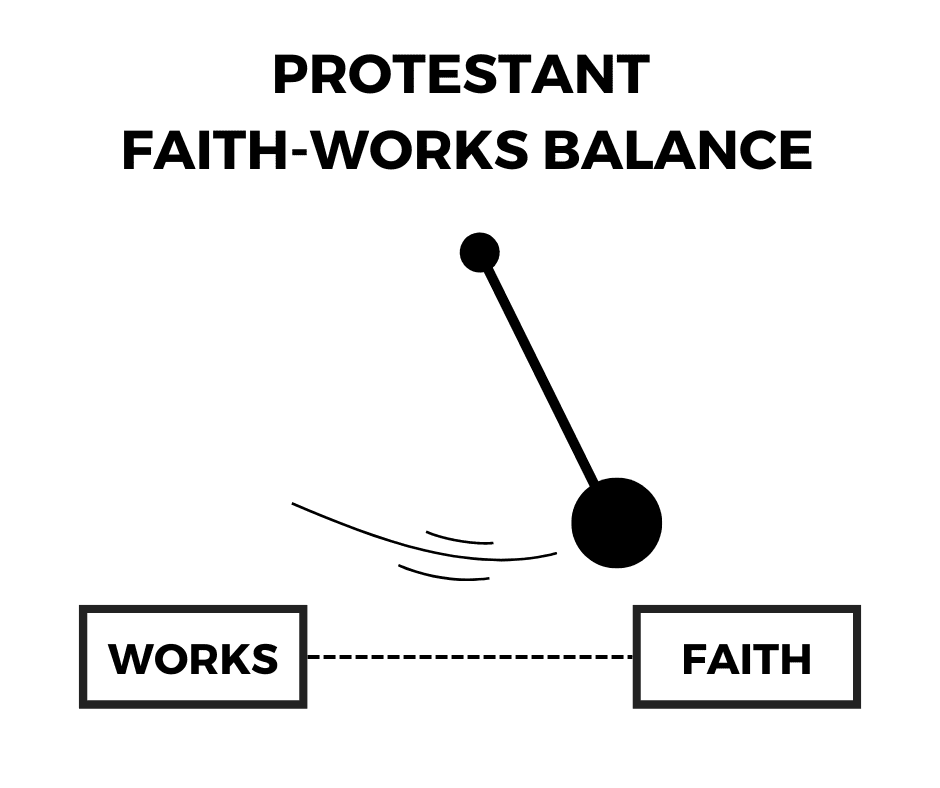The Unknown Reason Prayer & Faith Aren’t Creating Church Growth
In the Christian Church, we have a long theological tradition of struggling with the ideas of faith and works.
Secular Religions: Every religion in the world other than Christianity believes in fully works-based methods of getting into a good afterlife.

Catholicism: Catholics believe that you need both works and faith simultaneously which is the purpose of indulgences, and praying to the saints. They believe that faith saves us but works also have some role in salvation. Therefore we still need to atone in some way for our sins through indulgences or praying the rosary. Similarly, we must communicate with god through the saints or Mary because they are morally superior to us and are more worthy of communicating with God. This is also why Catholics have sainthood generally. These saints who are superior to us (because of their works) pass our prayers to God. In this system, we still fail to find the personal, intimate relationship with God that is found in many Protestant denominations.

Protestantism: Protestants on the other hand believe in a 1, 2 punch. We are saved purely through faith and faith alone. Once saved, we express our gratitude through good works. Works reveal and demonstrate faith but do not save a person.
The generalized Protestant theology expressed here is the view that will be taken in this course.
While I believe this to be the theologically superior view, Protestants have generally become unbalanced and focus almost exclusively on the faith and spiritual side of the equations.

The 1-2 punch implies that first we come to saving faith, and then we get to the work of expressing that faith out of gratitude (not for salvation). But the Protestant pendulum seems to be stuck on faith only.
The practice of works is disappearing from the protestant church. Here are some symptoms of this problem:
Most Sunday messages have to do with subjects related to faith, hope, prayer, relationship with God, identity, etc. These are all subjects that are pertinent to faith. They are vitally important subjects, but we only preach these subjects. When was the last time you preached a sermon on how to behave in the workplace or how people can and should get their families in order? When do we preach that we “work out our faith with fear and trembling“, “he who loves me obeys my commands” and that “faith without works is dead“? These are sermons subjects on the works side of the pendulum and we seem to have forgotten it in our sermons. (Ref: Phil 2:12-13, John 14:21, James 2:14-26)
We see the disappearance of works in the rising volunteer issues ministries leaders are facing. People just aren’t willing to volunteer like they used to.
We see the disappearance of works in the growing culture of Christmas and Easter-only church attendees. Nominal Christianity is exploding and Christians who publicaly live their faith are on the decline.
Why is this happening? Christianity in the west is collapsing because we have been preaching faith in your heart since the 1950’s and when fiath in your heart is all you need, then people also believe they don’t have any responsibility to pay attention to their works.
This faith-only thinking is also present in ministry schools. In my four-year ministry program I learned the following:
- 50% – 2 Years of prereqs including non-ministry related subjects like College Algebra.
- 20% – How to read and interpret the Bible (hermeneutics)
- 10% – Christian Philosophy & worldview training
- 10% – How to speak from a stage
- 3% – Various modes of inviting God’s presence and communicating with God through prayer.
- 3% – Various modes of inviting God’s presence and communicating with God through worship.
- 3% – Discussion and education on what kinds of faith are required for the incitement of revivals.
Outside of the prereq classes, this type of curriculum is largely focused on Divine Revelation-centered education and faith subjects.
Minsitry schools seem to have forgotten to give you all of the information related to the daily operation of a successful ministry. There is little or no training on how to manage &steward ministry finances, how to delegate tasks, how to communicate with difficult church members, how to do administrative tasks, how to manage church marketing, how to create a value proposition that your community cares about, how to run risk/reward calculations.
The current state of ministry training leaves ministry leaders with a toolset that is almost completely dependent on faith based church growth strategies like prayer, hope, casting vision, inviting God to move miraculously – etc.
This is the root cause of the church growth struggle most ministries are facing. It’s time to stop asking for a miraculous catch of fish and buy a fishing pole. This course will be your fishing pole.
In this course, we won’t be focusing on the spiritual elements of ministry. Not because it’s not important, but because I already know you have faith, and that you know how to pray and that you have a relationship with God.
In this course, we are going to go deep into the natural order of the world, to understand how God made creation and people functioned. When we learn how God created things to function properly, then we will understand how to grow our ministries.


Leave a Reply